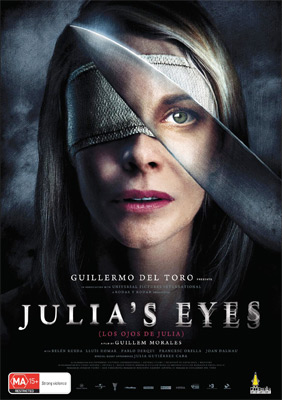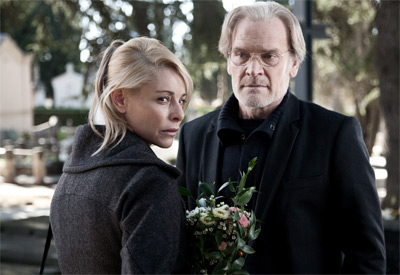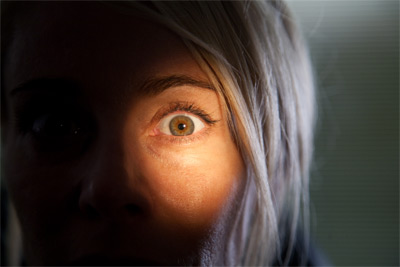Guillem Morales Julia's Eyes Interview

Guillem Morales Julia's Eyes Interview
Cast: Belén Rueda, Lluís Homar, Pabko Derqui, Francesca Orella, Joan Dalmau, Clara SeguraDirector: Guillem Morales
Genre: Thriller
Rated: MA
Running Time: 112 minutes
Synopsis: Open your eyes to a bold new vision in gothic thrills and chills from acclaimed producer Guillermo del Toro (Pan's Labyrinth, Hellboy).
A tantalising Giallo?infused tale of terror and the smash sensation of the 2010 Spanish box office ? Julia's Eyes is not only "cleverly original" (FEARnet), but a full?tilt assault on the senses.
When a young woman, suffering from a degenerative eye disease, discovers her twin sister hanged in the basement of her house everything points to suicide. Itched by other suspicions Julia (Belén Rueda, The Orphanage) decides to investigate what she intuitively feels is a murder case and embarks on a dark journey where the emanating light is literally fading to a flicker at the tunnel's twisted end. As Julia begins to uncover the terrifying truth about her sister's death, her sight deteriorates, blurred between a series of unexplained disappearances, deaths and her own desperate struggle for survival.
With a knowing nod to classic Hitchcock, Argento and De Palma Julia's Eyes is a chilling new chapter in Spanish shock cinema.
Release Date: 2nd of June, 2011
Notes About the Film
"Los Ojos de Julia" (Julia's Eyes) is a journey into the physical and emotional darkness of a woman who is forced to face her most intimate fears. The protagonist's increasing isolation, that of a woman losing her sight, serves as a means of telling, in the form of a terrifying nightmare, the story of a journey of acceptance, of overcoming your own limits, of love, and of survival. As in the world of emotions, "Los Ojos de Julia" plays with the fine line separating the visible from the invisible, the real from the unreal, what we see from what we imagine. And it does so by placing its heroine in extreme situations, obliging her to solve a jigsaw puzzle for which there are barely any pieces. As Julia begins to piece things together, she starts to realise that something terrible is occurring around her, something that no one else seems to notice, and which will leave her alone in the face of danger.
About the Script
"Los Ojos de Julia" uses the horror genre to tell us the story of a woman incapable of accepting her coming blindness. This script is designed as a race against the clock, in which each revelation hides a tiny answer to the mystery. It's a script that seeks to involve the audience, placing them in the protagonist's shoes. Her eyes are the eyes of the audience. What Julia sees, the audience sees. What Julia feels, the audience feels. And what Julia fears, will be what the audience is afraid of. This sense of involvement is pushed to the limit in a formal and emotional game plan designed to trap the viewer to the extent that they are dragged with the heroine into the darkness where something terrible lies hiding. The answer.

Interview with Guillem Morales
Question: Los Ojos de Julia (Julia's Eyes) is your second film. What differences did you notice in comparison with your first feature?Guillem Morales: A second film is even more important than your first. You can't risk making any mistakes. And in Los Ojos de Julia I felt this responsibility, which means that you demand much more from yourself and from the whole team that surrounds you. And if the project is much bigger than your first film then your responsibility has to rise to that challenge. In Los Ojos de Julia, my primary aim is to entertain the audience, to leave the viewer breathless, so that they embark on a roller?coaster of emotions that doesn't stop until the end of the film. Despite the fact that I think Los Ojos de Julia is a more adult film than my first, I definitely enjoyed making it more.
Question: But you stayed faithful to the thriller format...
Guillem Morales: I like the thriller genre and I feel extremely comfortable with it. Although there are some people who think otherwise, it's a genre that doesn't impose limits. A thriller can be horrific, humane, exciting, emotional and can harbour all kinds of stories, but due to this form, you know that they'll be told in such a way as to grab the audience from the start. A story can be good. But if it's told with suspense and tension, then it's twice as good.
Question: How did the idea for Los Ojos de Julia come about?
Guillem Morales: I had an image in my head of a woman with bandaged eyes. Her sight had been operated on and she had to wear the bandages for two weeks to regain her ability to see. But if she accidentally removed the bandages, the fruits of the operation would be destroyed. In some way I felt instinctively that although she was 'blindfolded' this woman would start to see things more clearly than ever. At the start, that's all I knew. It was just an idea. But I knew that behind this image there was a good story to be told.
Question: Wait Until Dark, Blind Terror... a few films starring blind women have already been made.
Guillem Morales: There are lots of films about blind women or blind characters. But not so many that describe the process of someone losing their sight, someone who feels that they're going to be condemned to a world of darkness. In this sense, Los Ojos de Julia, isn't a film about a blind woman. It's a film about a woman who's going blind. But before losing her sight forever, she'll have to see things, important things; that she'd never seen before, and these can be either beautiful or terrible...
Question: How did the connection to Guillermo del Toro come about?
Guillem Morales: I met Guillermo in London some time ago, I told him the story and he supported the project right from its beginning!! It was wonderful because he believed in us and in Los Ojos de Julia when it was only a draft script, and once involved, he encouraged us to keep on opening doors to explore all of the narrative possibilities provided by the story. From Guillermo I've learned to listen and to reflect on decisions, even when you're making them with your soul.
Question: Previously you wrote all of your scripts on your own. Los Ojos de Julia was cowritten with Oriol Paulo. Why did you decide to collaborate with someone?
Guillem Morales: Writing with someone is better than writing alone. It's more creative, fun, and constructive. They say it's not easy. But I've had the great fortune of finding someone with whom I get on very well on a creative and on a personal level. And Los Ojos de Julia won't be the last project we make together.
Question: The script is full of twists and coups de theatre that often come as a surprise. Are these indispensable for writing a good thriller?
Guillem Morales: Absolutely. In a thriller it's vital that you tell the story in the most exciting way possible. And this means releasing the information bit by bit to keep the viewer pinned to their seats until the final frame.
Question: The film's aesthetic is a little surprising. You've moved away from the Gothic without abandoning the theatrical aesthetic included in the confines of the thriller genre. How was this achieved?
Guillem Morales: This was a very deliberate creative decision and one that I feel very proud of. It would have been easy to give the film a Gothic atmosphere. But we wanted to try something more special, more disturbing. In fact, the aesthetic premises of Los Ojos de Julia were based more on video games, of which I'm an absolute fan, than on films. I wanted to impregnate the whole creative team with the influence of my favourite games. And the end result has been an aesthetic with watered down central European influences. It's not a Gothic aesthetic, but it does give the film the right atmosphere for such an eerie story and perfectly describes a world in which there's nothing beautiful left to see.
Question: One of the film's highlights is its camerawork.
Guillem Morales: Exactly. I pay a lot of attention to detail to this aspect. And the camera work in this film has been difficult but extremely rewarding. When you don't have great special effects to visually impress the audience, you have to concentrate on planning and executing the camera work. It's where you have the power to impress without abandoning your ability to convey the characters' emotion, frame by frame. To date, it's the most technically complex film that I've made.
Question: Why Belén Rueda?
Guillem Morales: When I met Belén for the first time, I knew immediately that she had that special light that only film stars have, the light that makes you fall in love with her. When we finished reading the script she looked up, and I knew that her eyes were Julia's eyes. Belén is beautiful and talented. And it's not often that these two things go together. But above all, Belén possesses a generosity as an actress and as a person that make her an excellent companion for long journeys. And a film is a long journey. In this way, Belén is any director's dream actress. One anecdote is that I promised Belén that for the first time she'd come across as sexy in a film. And I think I've achieved this. Belén has never been so desirable as in "Los Ojos de Julia." It's going to be a surprise for many people.
Question: And then there's Lluís Homar.
Guillem Morales: Belén needed a protective husband. And Homar needed a woman to fall in love with. Together in this film they make an intelligent and wonderful couple. Their complicity gives us an adult relationship that's absolutely credible in all respects. Working with Homar is an immense pleasure that forces you to revise every aspect of the scene until you achieve a surgical precision.
 Question: The film concerns a woman who loses her sight. A priori, isn't going blind a sad and terrible thing?
Question: The film concerns a woman who loses her sight. A priori, isn't going blind a sad and terrible thing?Guillem Morales: Losing something is always terrible. Losing possessions or things that you have achieved for example. Sometimes you lose material things, people or feelings. Loss always entails grief. And grief is always horrible. But losing one thing always implies gaining something else. And that's where we have to concentrate. Because there's nothing sad or terrible in that. Going blind isn't pleasant, but it doesn't mean that everything ends there. It means transformation. And transformation is a painful but incredibly positive process if we take it for what it is: an evolution. Going blind isn't as important as the attitude we have towards this change. And that's Julia's journey.
Question: In other words, the theme of vision is the most important part of the film...
Guillem Morales: "Los Ojos de Julia" is structured around seeing. Of what it means to see but also what it means to be seen, because the act of seeing is reciprocal. And in our society, things are both visible and invisible. And you have to learn to see everything, only sometimes not only with your eyes.
MORE
- Mission: Impossible Fallout
- Glenn Close The Wife
- Allison Chhorn Stanley's Mouth Interview
- Benicio Del Toro Sicario: Day of the Soldado
- Dame Judi Dench Tea With The Dames
- Sandra Bullock Ocean's 8
- Chris Pratt Jurassic World: Fallen Kingdom
- Claudia Sangiorgi Dalimore and Michelle Grace...
- Rachel McAdams Disobedience Interview
- Sebastián Lelio and Alessandro Nivola...
- Perri Cummings Trench Interview



